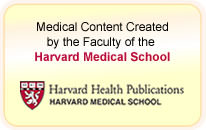
Conditions in Depth
This page contains the basic information about Irritable Bowel Syndrome (IBS) .
Return to the Irritable Bowel Syndrome (IBS) Main Condition Center
Treatment
Changing your diet may improve symptoms dramatically. It often takes a long time to discover what works well for you. And you may need to alter your original program if symptoms flare.
Keep track of the different foods you eat throughout the day. See which foods seem to make your symptoms worse. After you discover your particular trigger foods, eliminate them from your diet. Some common IBS trigger foods include:
-
Cabbage, broccoli, kale, legumes and other gas-producing foods
-
Caffeine
-
Alcohol
-
Dairy products
-
Fatty foods, including whole milk, cream, cheese, butter, oils, meats and avocados
-
Raw fruits
-
Foods, gums and beverages that contain sorbitol, an artificial sweetener
The way you eat may help to create IBS symptoms. Eating large meals can cause cramping and diarrhea, so eating smaller meals more often may help some people with IBS. Eating quickly can cause you to swallow air, which can cause belching or gas.
Adding fiber to your diet, especially if constipation is one of your main symptoms, often helps to regulate your bowel movements and reduce abdominal discomfort. At first, fiber will increase the amount of gas in your system, so add fiber gradually. Over time, the body adjusts to the effects of fiber and the gassiness will decrease. Fruits, vegetables and whole grain breads and cereals are good food sources of fiber.
Your doctor may recommend a fiber supplement. Some experts believe that the fiber methylcellulose creates the least amount of gas, and brands of this fiber are often recommended for people with IBS. Psyllium is also a good source of fiber.
If your symptoms are not relieved after you eliminate trigger foods and add fiber, your doctor may prescribe medications.
For people that have frequent loose stools (diarrhea-predominant IBS), medication options include:
-
Antidiarrheals — loperamide (Imodium), diphenoxylate (Lomotil and other brand names)
-
Antispasmodics to reduce cramping — dicyclomine (Bentyl)
-
Pain-reducing agents — amitriptyline (Elavil), desipramine (Norpramin)
-
Alosetron (Lotronex) is approved only for women with severe diarrhea-predominant IBS who have very severe diarrhea and have not responded to other treatments. To receive this drug, you must sign a form stating that you are aware of life-threatening complications, such as a blocked, ruptured or damaged bowel
For people with constipation-predominant IBS, fiber and plenty of fluids are the mainstays of therapy. If medication is needed, your doctor may prescribe an osmotic laxative such as lactulose.
Other drugs available for constipation predominant irritable bowel syndrome include:
-
Lubiprostone (Amitiza) is approved for women with persistent constipation.
-
Linaclotide (LINZESS) is approved for adults age 18 and older.
Both drugs act on the cells that line the inside of the intestines. They promote increased fluid secretion into the intestine, making stool passage easier.
From Health A-Z, Harvard Health Publications. Copyright 2006 by the President and Fellows of Harvard College. All rights reserved. Written permission is required to reproduce, in any manner, in whole or in part, the material contained herein. To make a reprint request, contact Harvard Health Publications. Used with permission of StayWell.